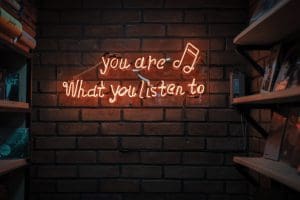Music, Social Media, and Image
Music is an extension of ourselves and a way to not only express but figure out our identity. Studies have shown that adolescents listen to more music than any other age group and use it to help shape their self-image, as different music genres often carry a niche culture and aesthetic.
Research has also shown that adolescents use music as a way to connect with others and make friends with those who have similar tastes. Social media is one way for people to bond over their music preferences.
Using social media to find out what your peers are listening to isn’t new: MySpace was known for being the place to discover and hear other’s music taste online. Not only would aspiring bands and artists post their content there (think of musicians like Panic at the Disco and Taylor Swift), but users could include a playlist of their current favorite songs that was visible on their page. Of course, aspiring musicians can also use sites like Soundcloud , YouTube, Bandcamp, and even TikTok to post their original works.
Nowadays, social media sites allow users to post what music they listen to as a Facebook status or play a song snippet over their Instagram story. Even Spotify counts as social media: Spotify gives you the option to add friends through your Facebook contacts, so they can see what you’re listening to in real-time. Spotify Wrapped has gained immense popularity over the past few years, where users can share the highlights of their listening sessions over the year on their social media.
Listening to music is a deeply personal act. Sometimes, we might fear judgment from others for our music preferences. Curating what people see can be similar to picking and choosing what we wear in public; it’s a piece of our image. Publicizing our music interests can be anxiety-inducing. Some might have a genre that they’re embarrassed of or that isn’t very popular with their friends. Some may be indifferent to sharing, while others may find it enjoyable. Some may even turn this feature off entirely and listen to their music without others knowing, such as Spotify’s “private” listening option.
The public and private feeds on Spotify shed light on how people can alter how they listen to music based on how others perceive them. It’s much easier said than done not to care about how people view your music tastes. At the same time, music can be a powerful tool that boosts our mood or even help us heal. It’s natural to fear judgment, and what feels or sounds good to you is what matters most.
If anything, if you want to expand your taste in music outside of Spotify’s Discover Weekly, the friend feed could be a great option to find some new songs.
If you use Spotify, do you have the friends on your feed? Do you look at what others are listening to, or do you think others are looking at yours? Why do you think some people judge each other’s music tastes so harshly? Does music play a role in how you may relate to friends?






Recent Comments